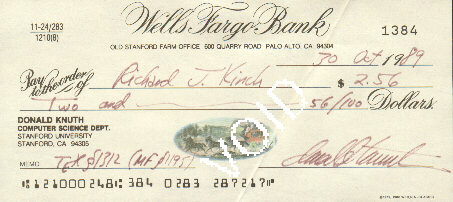
Donald Knuth's wit, humility, and mastery of technology are nowhere better exhibited than in his recognition of those persons who discover errors in his programs.
 |
Donald Knuth's wit, humility, and mastery of technology are nowhere better exhibited than in his recognition of those persons who discover errors in his programs. |
As he says in the preface to TeX: The Program,
"I believe that the final bug in TeX was discovered and removed on November 27, 1985. But if, somehow, an error still lurks in the code, I shall gladly pay a finder's fee of $20.48 to the first person who discovers it. (This is twice the previous amount, and I plan to double it again in a year; you see, I really am confident!)"
The odd figure of $20.48 comes from a periodic doubling of the initial one-cent reward. He continued this doubling for quite a few years after 1985, and the dollar amount of such a reward became quite large.
So why was my reward in 1989 only $2.56? The particular bugs that I discovered in TeX and METAFONT were not functional, and Knuth placed a much lesser reward value on bugs which did not affect the correct working of the programs. The then-current reward of $2^{15}$ cents ($327.68, arbitrarily declared the maximum) was arbitrarily scaled down to $2^8$ cents.
These bugs consisted of several lines of code which were redundant, apparently originating in an inadvertent re-use of a fragment from another portion of the larger program. In creating my translations of TeX from the WEB source to the C language, which at that time were the only such versions, my automatic translator/compiler surprised me when it identified the program statements as redundant. Apparently, during many years of use, no human being had actually examined those lines of code carefully enough to see them as redundant. At the annual TUG meeting at Stanford in 1989, Knuth immediately recognized the problems when I pointed them out to him.
Considering the number of bugs that have been discovered by TeX implementors, one must wonder how Donald Knuth avoided being impoverished by his reward policy. The answer is simply that the honor of the recognition from Knuth is the real reward, and not the money itself. In essence, he recognizes you for discovering something important to him that he was unable to see. Thus, I have yet to meet anyone who actually cashed one of these checks. Ironically, Knuth's mastery of numbers must have been severely tested over the years, as he must have had to deal with a checkbook continually out of balance from so many open items. At least in the US banking law, checks that are over 6 months old are declared "stale-dated" and become non-negotiable.
In 2002, Knuth stated at an AMS-sponsored lecture that, "There has been no error reported in TeX since 1994 or 1995," and that he would not consider the evaluation of new reports until about 2003. So it would seem that the supply of Knuth reward checks for TeX is roughly fixed at its present level. The Wikipedia article on the subject, "Knuth reward check", has a table listing my specimen, and a number of more recent ones which relate to other books.
I expect that someday this bit of historical computer science may be worth far more than its small face value at the time of issue. Certainly it is worth more to me as a token of distinction. The public has a penchant for collectible items having to do with history. I believe that in the future, computing will become such a vital aspect of human enterprise, that its early development and its pioneers will become celebrities of great stature. Artifacts of the time will come to command a great value to collectors.
The TeX corpus is a shining gem in the technological revolution of computing in the 20th century. For now this document (in color reproduction, the original heirloom locked safely away for preservation) graces my office wall, showing my pride in being a small part of that revolution, like a medal from the commander-in-chief.
See the hilarious result of Google's (http://www.google.com) automatic translation of this page to German and back to English.
Return to the TrueTeX home page.